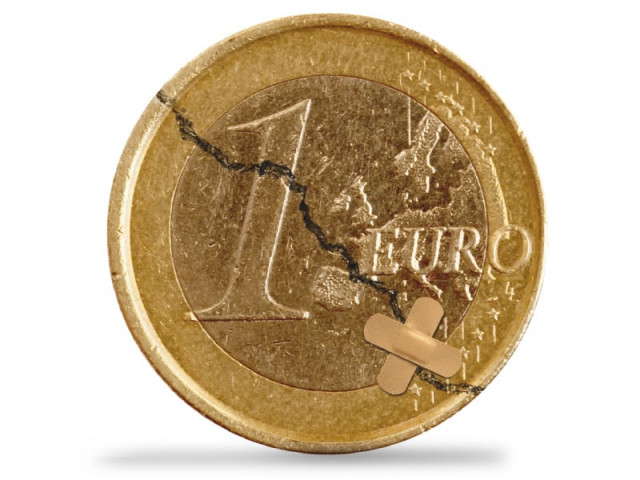Uncertain times: Will the euro survive – for unity or competitiveness?
End of euro zone means a volatile financial environment for Pakistan.

On the surface, Pakistan seems far too distant from what is playing out in the European capitals. The latest financial crisis, engulfing the whole of Europe and resulting from sovereign debts amassed by Portugal, Ireland, Italy, Greece and Spain, is spiralling into a perilous phase and the outcome will impact not only the developed countries, but also the less developed economies such as Pakistan.
If Spain leaves the euro zone, currently under consideration, the future of euro will at best be uncertain. The question on everyone’s mind would be who among the heavily indebted would be the next to go. And then, who next?
Whether euro stays or goes does not seem to be of immediate concern to Pakistani businesses or, for that matter, the public officials. The crisis barely gets mentioned in the local media. This indifference could be traced to two factors.
First, Pakistan is a marginal economic player on the world stage and, thus, any discussion of the financial crisis that has gripped the western world’s attention would be purely academic. Second, Pakistan has other major life and death issues that demand attention. These concerns push the European financial crisis to the back burner.
Comparatively, it is true that Pakistan does not matter much to the global economy. It contributes less than 3% to the global economy. But Europe matters to Pakistan. Pakistan exports a whopping 21% of its exports to the 27 European Union countries and imports a little over 11%. For better or worse, it is this buying and selling that will be affected by what happens to euro.
What will happen to euro? Although the economic conditions leading to the introduction of euro have changed, the motivation has not. Towards the end of the 20th century and the beginning of the 21st, European firms faced a new market reality – intensified competitive pressures from firms in emerging economies.
And over the last two decades, the intensity of these pressures has increased significantly. European firms now have to compete not only in low-value products, but also in high-value, high-profit margin products. In this new milieu, cost and competitiveness have become critical strategic considerations. And, so has financial stability.
A decade ago, the selling point for euro was that it would enhance global competitiveness of the European Union. Today, the goal for euro has not changed. Europe still needs euro.
There are three reasons why euro will survive. First, if Europeans turn their backs on euro, it would mean that each departing country would have to reinstate its own currency, thus, shrinking the number of countries in the euro zone. With more currencies floating in the market, the amount and degree of volatility surrounding exchange rates would increase substantially.
Second, if euro zone countries were to go back to the pre-euro regime, it would increase transaction costs. These costs do not add any substantive value to products traded, they merely increase the final price, with benefits accruing mostly to financial intermediaries, not to the consumers. The increase in transaction costs will negatively impact European firms not only in the troubled economies, but also in those that are doing well.
Third, with each country assuming the power to make fiscal and monetary decisions, the proclivity to opportunistic behaviour will increase. Greece, for example, with its own currency could have depreciated its currency to find an exit from the current crisis. But this would have had an adverse impact on the competitive position of others. Each country, acting to enhance its own self-interest, may gain in the short run, but the overall outcome of such actions will be reduced competitiveness for the region, not an increase in competitiveness.
Given the emerging global competitive situation, Greece, Spain, Germany, France and others will need to find a common ground soon, as together they have much to lose by giving up on euro. Not for the unity of Europe, but for its competitiveness, the euro will need to survive.
For Pakistani businesses also, the departure of euro will mean operating in a more volatile financial environment and, thus, having to bear an unneeded pressure on profit. It is also in Pakistan’s interest that euro survives.
The writer is a professor of marketing at Marquette University, Milwaukee, Wisconsin, USA.
Published in The Express Tribune, June 11th, 2012.



















COMMENTS
Comments are moderated and generally will be posted if they are on-topic and not abusive.
For more information, please see our Comments FAQ